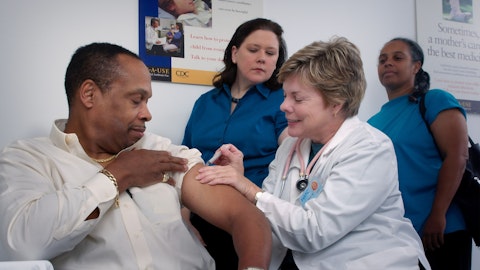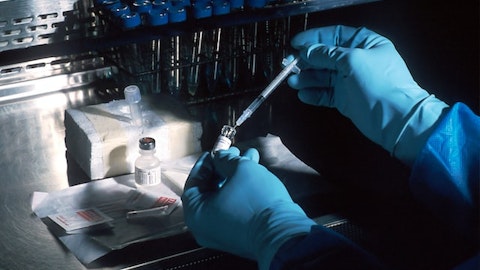Steve Scala: Thank you so much. Two questions. First for Dave. In the third quarter of 2022, you said that in HER2 could be one of the largest medicines in oncology. Are you willing to say the same for Dato-DXd based on what you now know? And second, for Susan, does AstraZeneca plan to alter the study design of TROPION-Lung07 and TROPION-Lung08 based on the results of TL01? Thank you.
David Fredrickson : Thanks, Steve. I continue to believe that in HER2 has the opportunity to be one of the largest medicines and certainly one of the most transformative medicines in the treatment of cancer. I will just come back to — we’ve talked a lot on in HER2 about three important pillars. And the PanTumor02 data, and Susan talked about that in greater depth earlier, really does begin to open up the opportunity to take an HER2 into areas outside of breast gastric in lung cancer, and I think it’s really promising for that. And with Dato, I would say, similarly, that I confirm my enthusiasm for Dato’s opportunity to be potentially as big as in HER2. And I think that it’s going to be an important medicine. Certainly, also relative to last quarter having a positive Phase 3 readout reinforces confidence in the ability to be able to take a program forward, and I think that that’s a big driver of it.
And I think the last thing, when we did the deal on data, we knew that there was a big opportunity to replace systemic chemotherapy in lung cancer and also in breast cancer. The real opportunity for Dato to be bigger than in HER2 would be if we can take it into tumor types outside of those two areas. And so that’s really what we look forward to seeing if we’re able to effectively do.
Pascal Soriot : Thank you, Dave. Just also will state the obvious, which is — we have a lot more data points for HER2 than we have for that or we need to keep this in mind, of course, but the potential is indeed very large. Simon Baker…
Susan Galbraith : The second question…
Pascal Soriot : Sorry, there was the second question, sorry.
Susan Galbraith : So thanks for the question again. So I think I said before, TROPION-Lung on, I expected that we were going to learn some things from that trial. And indeed, there are learning’s in TL01, as you expect from any clinical trial, particularly the first pivotal arm trial. So it’s normal practice for drug development that as you go along and you learn, there may be adaptations trails. So I think that’s just a normal part of drug development. And I just – I’d say, look we remain confident that that is extremely important medicine in lung cancer, including in the first-line settings of the trials that are already ongoing.
Steve Scala: Thank you.
Pascal Soriot: Thank you, Susan. Simon, do you want to go ahead?
Simon Baker: Thank you, Pascal. Yeah, two questions, if I may, please. Firstly, on the Pfizer deal. You did allude to it on the slide a little bit, but I wondering if you give us a bit more color on what you’re buying. Is this more technology rather than specific products? You highlighted selling capsids on there. And specific to those, are there any characteristics that Pfizer brings that are differentiated in terms of selectivity and payload capacity. And then secondly, a question on brazikumab and inflammatory bowel disease. Now that you’ve written often terminated that project, I just wondered what your level of interest in that space still was. I see you’ve done some work with NLRP3 inflammasome inhibitors. But is this still an area that is under active development. Thanks so much.
Pascal Soriot: Thank you, Simon, to take us away a little bit from data. But Marc, you can go ahead and Mene?




